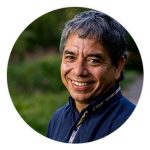An interview with two regenerative food systems leaders
In honor of World Food Day on Oct. 16, Raising Regenerative spoke with two different leaders in the space to get their perspective on the biggest challenges facing the food system.
 Caesaré Assad leads the work at Food System 6, a non-profit that is building a more equitable and sustainable food and agriculture system by supporting entrepreneurs focused on health, sustainability, and justice. Over the last 20 years, Caesaré has developed and led several food business innovations to address social and environmental challenges. Her expertise spans the private, non-profit, and corporate sectors, with a range of hands on, operational leadership roles as a chef, entrepreneur and business executive.
Caesaré Assad leads the work at Food System 6, a non-profit that is building a more equitable and sustainable food and agriculture system by supporting entrepreneurs focused on health, sustainability, and justice. Over the last 20 years, Caesaré has developed and led several food business innovations to address social and environmental challenges. Her expertise spans the private, non-profit, and corporate sectors, with a range of hands on, operational leadership roles as a chef, entrepreneur and business executive.

Reginaldo Haslett-Marroquin leads the innovative poultry-centered regenerative agriculture system at the heart of Regenerative Agriculture Alliance. He focuses on the development of multi-level strategies for building triple bottom-line regenerative food and agriculture systems. He leads the design work and currently oversees system implementation in the United States, Mexico, Guatemala, and Columbia.
Assad and Haslett-Marroquin open up about the culture of cheap food, bio-diversity, and their hopes for the future. Read on for more.
What do you see as the greatest challenge facing our food system?
CA: The current status quo rewards extractive practices. We need to create a systemic shift towards prioritizing the people and the planet by enabling those who create regenerative value-cycles to win in the marketplace.
RHM: The culture of cheap food. Consumer choices drive the industries that dominate societies. There are many things in life that should be cheap, but not food or medicine. Cheap drives profits and profiteering drives down quality and integrity. Food should be outside of this real and corporations involved in food systems should be the most highly regulated as to how they extract value from ecosystems and consumers and as to the integrity of the final products that they deliver. In the food system, the culture needs to shift towards nutrition, per acre, per unit (apple, pound of chicken, egg, carrot, etc.) when as a society we start buying nutrition instead of “fill”, we will brake down the barriers that keep us from developing a real food system that can meet our nutrient and nourishing needs as well as those of the ecosystems health on which the integrity of our food system depends on.
How can regenerative agriculture (and a regenerative food system) address this challenge?
CA: Regenerative agriculture can address this challenge by supporting and prioritizing bio-diversity – both genetic (among plants and animals) and cultural (in the entrepreneurial ecosystem). A truly regenerative food system is one that recognizes the interconnectedness and complexity that makes life on earth possible and, as such, ensures that the planet can continue to sustain future generations.
RHM: By re-defining what food is – not fill, but nourishment
By building governing structures and accountability systems that hold those labeling their products regenerative to managing the whole supply chain according to outcomes that actually regenerate the systems as food is produced and traded, from ecosystems to consumer’s health, to worker’s rights to fair wages to consumers’ right to the most affordable nutrition, system-level integrity is central for regenerative agriculture to address the global food system’s challenges.
By bringing consumers and producers together and hold the businesses of the middle accountable to delivering value on both ends and reduce the profit making motivation as the only reason businesses engage in the food system.
By engaging the global institutions and the marketplace in supporting businesses who can handle the long-range capacity of regenerative agriculture to reduce risks and increase resilience, especially its capacity to reduce financial risks
By collecting, consolidating and validating the data that shows the real societal impact of focusing on nourishment as a foundation of evaluating what food is, rather than the price per farm output unit at the market. A nutrient rich unit of food is worth many nutrient deficient units of food. Outcome based measurements are the key to making regenerative agriculture the norm.
What steps are you taking in your work to address food system challenges?
CA: At FS6, we support entrepreneurs who are building with impact front-of-mind by coaching them through the complexity of a systems approach, matching them with mentors, and working to identify and align the unique sources and structures of capital that will support their growth, without compromising their vision. We also work to educate investors, foundations, and others with capital on the opportunities to revitalize our capital infrastructure to accommodate for the more holistic returns associated with regenerative investment opportunities.
RHM: Moving from project-based thinking (farm operations) to systems-level thinking. We also went from designing regenerative poultry farms over the last 8 years to building the systems to support the financial, technical, training and branding and national deployment of those farms.
Given your answers to the three questions above, what gives you hope for the future?
CA: The FS6 portfolio supports a culturally, racially and socially diverse selection of farmers, producers and entrepreneurs who are innovating around the ideas of regeneration in the food and agriculture ecosystem. I am inspired by these leaders; by the sheer volume of impact-driven entrepreneurs that we see on a daily basis; by seeing the expanding networks of support; and by the growing recognition amongst consumers and industry, that biodiversity and a regenerative approach represents the path forward.
RHM: How easy and rapidly the land and ecosystems regenerate. How much more value regenerative agriculture can deliver per acre of landscape engaged. How much cheaper and overall beneficial to ecosystems and consumers that a regenerative unit of nutrition is in comparison to conventional nutrient deficient, extraction-centered, climate-destroying, farmer unfriendly foods which also deliver a whole menu of food-related deceases and problems for consumers. It gives me hope that people are waking up to the true story behind corporate foods and realizing their mission was NEVER to nourish consumers, but to extract wealth from the land, farmers, workers and consumers in the name of food.
Sign up for Raising Regenerative news to be delivered straight to you inbox! Click here.
